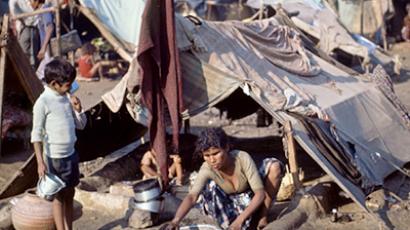Russian court finds no extremism in Hindu holy book
A Russian court has declared a Hindu holy book not to be extremist, denying prosecutors who sought to ban the text, claiming it incites religious hatred and enmity.
On Wednesday a court in Tomsk, Siberia, held a final hearing on the controversial book “The Bhagavad Gita as It Is” and decided against banning the book.After the verdict was announced, the prosecutor left the courtroom without commenting on the decision. The defense representative said that the verdict “shows that Russia is really becoming a democratic society.”The case was initiated by the prosecutor of Tomsk in June. In the petition to the court the prosecutors’ office asserted that the commentaries written by A. C. Bhaktivedanta Swami Prabhupada, the International Society for Krishna Consciousness, incite religious hatred and enmity. Thus he asked the court to ban the book as extremist. In August the court held two preliminary hearings, during which the prosecution explained that the commentaries in the book mark anyone, who does not follow Bhagavad Gita as inferior and justify their murder.The defense, represented by the local chapter of the Krishna Consciousness Organization, applied to the court asking for a human rights ombudsman to be present at the hearings. The court postponed the hearings till December. Ahead of the final court hearing, India’s external affairs minister S M Krishna met with Russian ambassador Aleksandr Kadakin to express his concerns over the sensitive issue. Another high profile Indian official, the Indian ambassador to Russia, Ajai Malhotra, has also commented on the issue saying that “the Bhagavad Gita is perhaps the most important and respected scripture in the world,” and has called the procedures in Tomsk “absurd” and “bordering on the bizarre.” Last week scores of Indian right-wing activists burnt the Russian flag in New Delhi in protest against a possible ban of the Gita. Activists from the Hindu political party, Rashtrawadi Sena, were carrying placards and shouting slogans saying they would not tolerate such disrespect to the Bhagavad Gita. Russian Hindus were also outraged by the trial and have been actively covering the hearings on blogs and on YouTube to attract public attention.However, Russian authorities rejected the complaints. “This is not about the book itself but about a poor translation and the preface written by the author," said Russian Foreign Ministry spokesman Aleksandr Lukashevich.
‘A broad interpretation of extremism’
“The Bhagavad Gita” has had multiple editions and translations into Russian. The one that led to the trial is supplemented by the commentaries from Prabhupada written in 1968.Sergey Serebryanny, the head of the Institute of High Humanitarian Studies at the Russian State University of Humanities and a prominent Indologist, says that Prabhupada added a lot of his own ideas and beliefs in his version of “The Bhagavad Gita.” Regarding the accusations of extremism, Serebryanny explained that Russian authorities interpret the term “extremism” broadly, so they can label extremist anything going against the authorities, whether secular or religious.“I know some Russian followers of Prabhupada sometimes argue with them, but I think they have the same right for the freedom of conscience as believers of other religious confessions that observe the laws of the Russian Federation,” Serebryanny concluded.Meanwhile, the Tomsk chapter of Krishna Consciousness said this particular edition of the book had been approved by prosecutors twice in 2004 and 2005. The version on trial, they said, which was published in 2007, had only minor stylistic corrections.













